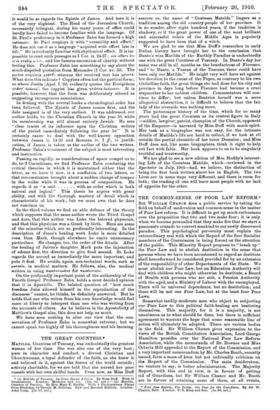THE GREAT COUNTESS.* MATILDA, Countess of Tuscany, was undoubtedly the
greatest woman of her time. She was also one of the very best ; pure in character and conduct, a devout Christian and Ohurchwoman, a loyal defender of the faith, as she knew it and believed in it, against the forces of the world outside ; actively, charitable, for we are told that she nursed her poor vassals with her own skilful hands. Even now, as Miss Duff
• (1) Matilda of Tuscany La Gran Donna d'Italia. By Nora Duff. With 16 Illustrations. London Methuen and Co. [10s. 6d. net.]—(2) Matilda, °Gumless of. Tuscany. By Mrs. Mary E. Ruddy. With 4 Photogravure Plates from Drawings by George M. Sullivan New and Revised Edition. London: John Long. [7s. 6d. net.]
assures us, the name of " Contesaa Matelda " lingers as a tradition among the old country-people of her province. It is no wonder, after eight hundred years, if the tradition is shadowy, or if the great power of one of the most brilliant and successful rulers of the Middle Ages is popularly suggested to have been that of a witch.
We are glad to see that Miss Duff's researches in early Italian history have brought her to the conclusion that Dante's wise Matilda of the Earthly Paradise is undoubtedly one with the great Countess of Tuscany. In Dante's day her name was still in all mouths as the benefactress of Florence, and "to Dante, a Tuscan of the Tuscans, there could have been only one Matilda." He might very well have set against her devotion to the cause of the Popes, so contrary to his own Ghibelline faith, the great things she had done for his city and province in days long before Florence had become a cruel stepmother to her noblest children. Commentators will con- tinue to differ; but unless Beatrice herself was a mere allegorical abstraction, it is difficult to believe that the fair lady of the riverside was nothing more.
The picturesque history of the time, which for so many years had the great Countess as its central figure in Italy —soldier, lawgiver, patriot, champion of the Church, opponent of the Emperor—is narrated by Miss Duff with much spirit. Her task as a biographer was not easy, for the intimate details of Matilda's life are hard to collect, if we look at all outside the partial chronicle of her tutor Domnizo ; and Mies Duff does not, like some biographers, think it right to help out fact with fable. Her book appears to us to be singularly truthful and trustworthy.
We are glad to see a new edition of Mrs. Huddy's interest- ing Life of the Countess Matilda, which—reviewed in the Spectator in July, 1905—had, we believe, the distinction of being the first book written about her in English. The two Lives are in some ways very different, and there is room for both ; the reading of one will leave most people with no lack of appetite for the other.










































 Previous page
Previous page